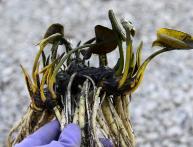Eggplant agricultural technology

Due to their southern origin, eggplants need good weather conditions, namely warmth. Even the slightest frost can destroy the plant. And if the temperature drops to +20...+15°C, the eggplant may react by dropping ovaries and flowers, slowing down the processes of growth and fertilization.
Lack of watering can lead to the same undesirable phenomenon.
The agricultural technology of eggplants is based on this, and dictates almost the only way to grow them - through seedlings.
To obtain seedlings, it is best to use seeds of elite varieties. And even in this case, it is recommended to select the largest specimens of seeds for sowing. Seeds that have undergone strict sorting are treated with agents that protect the plant from pests.
Seeds can be planted from the first days of March in film greenhouses or greenhouses. It is even better to use individual containers made of humus-earth material. This will protect the root system of young seedlings when transplanting them into open ground.
Eggplant agricultural technology includes the use of fertilizers at different periods of plant development. So, when sowing seeds, superphosphate is used as a mineral fertilizer. When the first true leaf forms on the plant, the ground is flavored with slurry, bird droppings or mullein.
To improve the growth and development of eggplants, you can use potassium salt and ammonium sulfate.It is important, after fertilizing procedures, to water the eggplant seedlings with clean water to clear the leaves of any remaining fertilizer.
A cloudy day or afternoon is ideal for planting seedlings in a permanent place.








